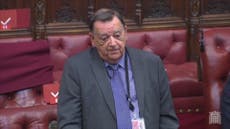I may sit in the House of Lords now, but I know the reality of food poverty. Boris Johnson hasn't got a clue
Seeing Marcus Rashford helping out at a food distribution centre triggered memories of my own childhood – that’s what led me to make my speech in the Lords

I’m at a total loss to understand why the government is digging in its heels by refusing to meet the cost of providing meals for schoolchildren during holiday periods. When they made their U-turn on this very matter in the summer, they must surely have sensed what a popular decision it was. It gave them political kudos, as well as ensuring that the basic needs of disadvantaged and vulnerable children were met.
I know from personal experience how important such a policy would be. I grew up in south Wales just after the Second World War. My parents had divorced and my mother was forced onto the streets with her two small boys. We eventually settled in a room offered by my grandparents. My mother went to work in the local tinplate factory and the heavy work soon contributed to a breakdown in her health from which she would never recover. There was no financial support from my father, so my mother’s only income was what she received from National Assistance, which barely covered our needs.
I was in receipt of free meals for the whole of the time I was at school. So term-time saw us well fed. But the holidays were a different story. I can still taste and smell the mounting panic as those holidays drew near. The money we had simply wouldn’t stretch to feeding two extra mouths. My mother needed to be imaginative with what she had but it was sometimes touch and go. From the age of 15, I spent every holiday in some kind of work – as a postman, with the Forestry Commission, helping a wholesale seller of meat products, part of a team demolishing our local ordnance factory and so much more. Times were tough. Food poverty is surely the very worst kind of poverty. And for children it’s worst of all.
I so admire Marcus Rashford for the way he’s given focus to these concerns. It was seeing him with his mum helping out at a food distribution centre that triggered memories of my own childhood experiences. And that’s what led me to make my speech in the House of Lords on Tuesday. People have since told me that they don’t expect to hear that Lords have gone through such things but, interestingly, immediately after my intervention, two other Peers approached me to tell me that they had had identical experiences.
Our ruling class (that’s exactly the right word to use) hasn’t much feeling for this problem. I’m pretty sure the Old Etonian at the head of our government, a man who loves setting up photo opportunities for himself in schools and laboratories and factories wearing his white coat or hard hat, doesn’t have a clue about how poor people really feel.
The government tells us about the massive amounts – millions of pounds we’re told – that have been given to local authorities who are best placed, they say, to spend some of it on responding to the nutritional needs of poor children. Some authorities do just that. But others won’t.
The response in our communities to the government’s stance on this matter has been remarkable. There has been a huge effort by civic society to respond to the needs of the moment. Individuals, food banks, restaurants and others are doing what they can. In some communities, this will make a huge difference. Others less so.
It’s a national initiative that’s called for. Without it, we’re bound to see a patchwork response, a postcode lottery. Some children who live in the right places will benefit both from the priorities of their local authority and/or from the good will of their local community. But others won’t.
It doesn’t take much of a guess to work out where people are likely to slip through the net. Those already among the poorest are likely to suffer the most. ‘Twas ever thus. Yet all so avoidable.
Leslie Griffiths is Lord Griffiths of Burry Port



Join our commenting forum
Join thought-provoking conversations, follow other Independent readers and see their replies
0Comments